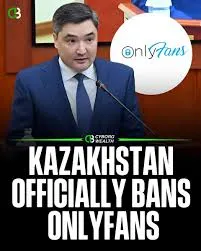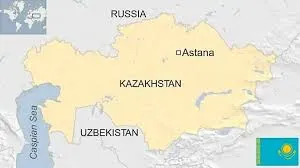BREAKING: Kazakhstan officially bans OnlyFans

Kazakhstan has officially announced the ban of OnlyFans, a subscription-based content platform that allows creators to share adult and non-adult material with paying subscribers. This move, which has drawn significant attention both within the country and internationally, marks the latest in a series of regulatory steps taken by governments around the world to regulate online platforms. The decision to block OnlyFans, a platform that has gained immense popularity over the last few years, particularly for adult content, reflects Kazakhstan’s increasing efforts to control internet content and enforce stricter laws on digital platforms.
The ban, which was confirmed by the Ministry of Digital Development, Innovation, and Aerospace Industry of Kazakhstan, has caused an uproar among many of the platform’s creators and subscribers. OnlyFans became widely popular during the COVID-19 pandemic as a means for content creators to earn money, particularly in the adult entertainment industry. The platform allowed individuals to generate income by sharing exclusive content with subscribers who paid a monthly fee. Although OnlyFans began as a platform for a variety of content creators, it became predominantly associated with adult content, with many adult film stars and independent creators finding financial success on the site.
The Kazakhstan government’s decision to ban the platform stems from concerns over morality, national security, and the potential for exploitation. Authorities have expressed concerns about the spread of explicit material and what they regard as the harmful effects of such content on society. While the platform does allow creators to share non-explicit content, such as fitness videos, music, and cooking tutorials, the majority of its revenue is derived from adult content. Kazakhstan’s government argues that this type of content is incompatible with the country’s cultural and moral values, and therefore has no place in the public domain.
This ban is part of a broader pattern of internet censorship in Kazakhstan, which has become more pronounced in recent years. The country has passed numerous laws that place strict limits on online content, and has developed a reputation for heavily regulating the internet. In addition to the block on OnlyFans, Kazakhstan has also targeted other social media platforms and websites that it deems to be in violation of its laws. In particular, the government has been focused on controlling content related to politics, as well as online speech that is seen as critical of the government. In 2021, Kazakhstan passed a law that requires internet service providers to monitor and filter content to prevent access to websites that are deemed harmful to the public or pose a threat to national security.
The country’s internet censorship has faced international criticism, particularly from human rights organizations and advocates for freedom of expression. Critics argue that such measures violate the fundamental right to free speech and restrict access to information. They also contend that the banning of platforms like OnlyFans disproportionately affects individuals who rely on digital platforms to make a living. Many content creators, particularly those in the adult entertainment industry, have expressed frustration with the ban, arguing that it undermines their ability to earn an income and stifles their freedom to share content on their own terms.
Despite these concerns, the Kazakhstan government maintains that the decision to block OnlyFans is in the best interest of its citizens. Officials argue that the platform promotes immoral behavior and has a negative impact on public health and social norms. They claim that explicit content can have harmful effects on mental health, particularly for young people, and that regulating such content is essential for maintaining social order. In response to international criticism, Kazakhstan’s officials have defended their decision, stating that they are committed to protecting the moral fabric of society and ensuring that young people are not exposed to harmful material.
The decision to ban OnlyFans also reflects the growing global debate about the role of social media and online platforms in shaping society. Many countries are grappling with the complexities of regulating digital content, particularly when it comes to adult material. Some nations have adopted more laissez-faire approaches, allowing platforms like OnlyFans to thrive and grow, while others have imposed strict regulations or outright bans in an effort to maintain cultural values and prevent the spread of content deemed harmful. The debate over online content regulation is unlikely to be resolved anytime soon, as governments, content creators, and users continue to clash over the boundaries of free expression and the role of the internet in modern society.
For many of Kazakhstan’s young people, the ban on OnlyFans may be seen as a blow to their ability to engage with the global digital economy. The platform provided an opportunity for individuals to monetize their creativity and connect with a global audience, and the ban may limit these opportunities for aspiring content creators. While some may turn to alternative platforms, the reality is that Kazakhstan’s strict internet censorship laws make it difficult for people to freely express themselves online, particularly when it comes to content that falls outside of state-approved norms.
The ban also raises questions about the future of digital entrepreneurship in Kazakhstan. As more people turn to online platforms to supplement their income or build careers, the country’s internet restrictions may hinder the growth of the digital economy. In a world where digital content creation is becoming an increasingly important industry, Kazakhstan’s decision to block OnlyFans could isolate the country from the global trend of online entrepreneurship. It remains to be seen whether this move will have long-term economic consequences, particularly for Kazakhstan’s tech industry and the broader digital landscape.
As the dust settles from Kazakhstan’s decision to ban OnlyFans, it is clear that the country is taking a firm stance on internet regulation and content control. The ban has drawn widespread attention to the issue of online censorship, and it will be interesting to see how other nations respond. While Kazakhstan may see this decision as a necessary step to protect societal values, it is part of a larger global conversation about the balance between free expression and cultural norms. The future of platforms like OnlyFans remains uncertain, particularly in countries that are taking a more restrictive approach to online content. As the digital world continues to evolve, the question of how best to regulate online spaces while preserving freedom of speech and creativity will continue to be a point of contention on the global stage.
In conclusion, Kazakhstan’s official ban on OnlyFans represents a significant shift in the country’s approach to internet regulation and content control. While the move has sparked controversy both within the country and abroad, it underscores the growing influence of national governments in shaping the digital landscape. As the world grapples with the complexities of online content and freedom of expression, Kazakhstan’s decision serves as a reminder of the power governments wield over the digital economy and the ways in which they navigate the intersection of culture, morality, and technology.






